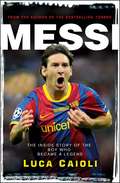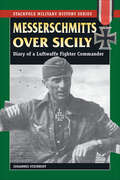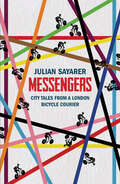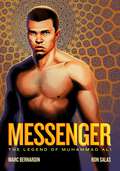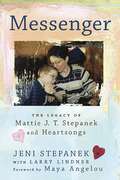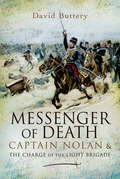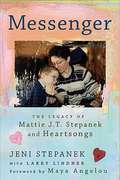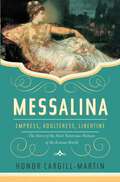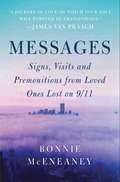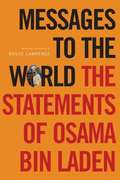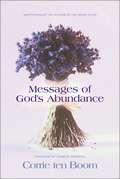- Table View
- List View
Messi: The must-read biography of the World Cup champion, now fully updated (Guillem Balague's Books)
by Guillem Balague'I have seen the player who will inherit my place in Argentine football and his name is Messi' Diego MaradonaFULLY UPDATED TO INCLUDE THE 2022 WORLD CUP TRIUMPH & MESSI'S TRANSFER TO INTER MIAMI As Lionel Messi raised the World Cup triumphantly into the air, the world watched on in awe. Messi's final peak conquered; his final dream achieved. It was the fairy tale ending to a glittering career. Yet despite delivering Argentina their third World Cup, Messi's time at Paris Saint-Germain came to a dramatic conclusion, and Miami awaited the Argentinian legend. Guillem Balagué has had unprecedented access to Messi's inner circle including the player himself: his coaches, team-mates and family. From tracing the origins of Messi's precocious talent in Rosario, Argentina, to chronicling his peerless seventeen-season career at Barcelona, and his tumultuous Parisian adventure, Guillem takes us behind-the-scenes of Messi's World Cup triumph and his long-desired move to the MLS. This is an epic, authoritative and compelling account of an enigmatic footballing genius. 'I can tell my grandkids one day that I coached Lionel Messi' Pep Guardiola
Messi: The Inside Story of the Boy Who Became a Legend
by Luca CaioliStill only 24, Lionel Messi is on course to become the greatest footballer of all time. The 2009 and 2010 FIFA World Player of the Year, he is fast, elusive, and mesmerising.
Messi: Life Lessons from a Legend
by Sean Deveney“You have to fight to reach your dreams.”From his start as the smallest kid on the team to his emergence as the greatest soccer player in the world, Lionel Messi’s journey to stardom is a master class in excellence. “The Atomic Flea” shattered records with his nimble, left-footed dribbling and prolific goal scoring, and won millions of fans on his beleaguered quest to win the World Cup. Messi: Life Lessons from a Legend details #10’s biggest struggles and triumphs playing for Barcelona, Argentina, Paris Saint-Germain, and Inter Miami. His story acts as a road map to success for anyone with the courage and passion to chase their own dreams.- Inspiring quotes from Messi himself- A biographical look at Messi’s early years, his rise to fame, and his most spectacular achievements- Original full-color art that captures the spirit of a champion- Guiding truths and hard-earned lessons to help you crush your own goals
Messi: A Biography (Vintage Espanol Ser.)
by Leonardo FaccioUn perfil fascinant, en tres temps, del futbolista més famós del món. Per Leonardo Faccio. Lionel Messi ha batut tots els rècords del futbol i s'ha instal·lat al panteó reservat a les grans estrelles: Pelé, Di Stéfano, Cruyff i Maradona. Des que va aterrar a l'esfera futbolística l'any 2007, l'argentí Leo Messi s'ha convertit en el rei de la pilota, i ho ha guanyat tot excepte el mundial. Una estrella d'aquestes dimensions es mereix més que l'habitual hagiografia o un pamflet morbós. En la millor tradició del periodisme narratiu, el que neix amb Gay Talese, Tom Wolfe o Norman Mailer, Leonardo Faccio ha dibuixat un perfil fascinant en tres temps del futbolista més famós del món, que amb només vint-i-quatre anys ha batut tots els rècords. Un noi tímid, petit i d'aparença fràgil, que s'ha convertit en la joia més valuosa de l'espectacle més gran del món. Passin i llegeixin! Ressenyes:«Amb Messi en marxa, la canxa no és un camp de batalla, sinó una geografia d'unitats d'emoció.»Manuel Rivas «Algun dia els hi explicaré als meus nets que jo vaig entrenar al Leo.»Josep Guardiola «Messi segueix jugant per aconseguir la bicicleta.»Juan Villoro «Sóc a la historia. Jo vaig contractar Messi.»Carlos Reixach «És una carícia més que em va fer l'Argentina.»Joan Manuel Serrat
Messi: A Biography
by Leonardo FaccioFor soccer enthusiasts and sports fans in general, an in-depth look at the life of the beautiful game&’s greatest star, Argentine footballer Lionel Messi.Whether you call it soccer, football, fútbol, or the &“beautiful game," it is the most popular sport in the world, and Argentine footballer Lionel Messi stands as one of its finest players—not only of his time, but of all time. Admired around the globe for his athleticism, skill, and fierce competitiveness, Messi has, at the age of 24, already shattered records at one of the most storied clubs in the world, FC Barcelona. Now, in this comprehensive biography, Messi fans can learn more about his life and career. Argentine journalist Leonardo Faccio describes how Messi, as a talented youth player in Buenos Aires, left his home for Spain in search of the medical help his family could not afford to treat his rare hormone deficiency. Small of stature, but possessing tremendous natural gifts, Messi developed into a star at Barcelona&’s famed Masia soccer school. In this book, Faccio has written not only a biography of an enigmatic celebrity, but a meditation on athletic genius, drawing on interviews with Messi himself, as well as with everyone from his family, teammates, childhood friends—even his favorite butcher. In-depth and intimate, soccer fans who enjoy watching Messi come alive on the field will delight as he comes alive on the page.
Messi, Superstar: His Records, His Life, His Epic Awesomeness
by Jon Stollberg Duopress Labs StaffMillions of kids around the world know Lionel Messi, and they all know he is really good. But do they know how good he really is? To answer this question, this engaging book goes beyond a traditional biography and describes Messi's life and record-breaking career through the use of fun graphics, comparisons with past and present players, playful reader challenges, and pages chock-full of interesting facts.<P><P> <i>Advisory: Bookshare has learned that this book offers only partial accessibility. We have kept it in the collection because it is useful for some of our members. To explore further access options with us, please contact us through the Book Quality link on the right sidebar. Benetech is actively working on projects to improve accessibility issues such as these. </i>
Messi vs. Ronaldo: One Rivalry, Two GOATs, and the Era That Remade the World's Game
by Joshua Robinson Jonathan CleggEssential World Cup Reading | Featured in The New York Times' 'What to Read During the World Cup'Wall Street Journal reporters Joshua Robinson and Jonathan Clegg offer a deeply reported account of the intertwined sagas and legacies of two of the greatest soccer players of all time—Lionel Messi and Cristiano Ronaldo—examining how their rivalry has grown from a personal competition to a multi-billion-dollar industry, paralleling the stunning rise, overwhelming excesses, and uncertain future of modern international soccer.For over fifteen years, almost any conversation about international soccer has always come back to two players—Lionel Messi and Cristiano Ronaldo—undoubtedly the greatest of their generation but with styles, attitudes, and fanbases that couldn’t be more different. For millions of people around the world “Messi or Ronaldo?” isn’t simply a barroom argument, or an affirmation of fandom, so much as a statement of philosophy, of values, of what global soccer is today and of what it will be tomorrow.Now Wall Street Journal reporters and co-authors of The Club, Joshua Robinson and Jonathan Clegg, unite the stories of Messi and Ronaldo into a single modern epic of global sports, detailing how one rivalry changed both the game and the business of international soccer—forever. Based on dozens of firsthand accounts and years of original reporting, Messi vs. Ronaldo weaves together the stakes, color, and characters at the heart of each man’s story, going inside the locker rooms and boardrooms where their legends were forged and revealing off-field drama as gripping as anything that happened on it. From their contrasting origin stories to their divergent career arcs and their conflicting reputations, these players have built their successes on opposite paths, yet each, in his own way, offers a riveting tale of triumph and excess. Taken together, their story embodies the astronomical growth of international soccer, how social media has revolutionized the power of sports celebrity, and how the desire to capitalize on the billions of dollars these players represent electrified some of the most storied clubs in Europe—Barcelona, Real Madrid, and Manchester United among them—and cost them almost everything.With the 2022 World Cup almost certain to be the last for both of these figures, Messi vs. Ronaldo offers a deeply researched look at their legacy and grapples with the impact that their talents have had on the game for better and for worse. Much more than a retelling of the dual accomplishments of these great players, this is truly a biography of a rivalry, one that has become a crucial lens for understanding the past, present, and future of global soccer.
Messi (edición actualizada): Messi y el mundial de su vida
by Leonardo FaccioUn perfil fascinante, en tres tiempos, del futbolista más famoso del mundo. Por Leonardo Faccio. Lionel Messi ha roto todos los récords del fútbol y se ha instalado en el panteón reservado a las grandes estrellas: Pelé, Di Stéfano, Cruyff y Maradona. Desde que irrumpiera con estruendo en el planeta fútbol en 2007, el argentino Leo Messi se ha convertido en el amo del balón. Una estrella de tamaña dimensión merece más que la habitual hagiografía o un panfleto morboso. En la mejor tradición del periodismo narrativo, el que nace con Gay Talese, Tom Wolfe o Norman Mailer, Leonardo Faccio ha dibujado un fascinante perfil en tres tiempos del futbolista más famoso del mundo que ya ha roto todos los récords. Un chico tímido, pequeño y de apariencia frágil, que se ha convertido en la joya más valiosa del mayor espectáculo del mundo. Pasen y lean. Reseñas: «Con Messi en marcha, la cancha no es un campo de batalla, sino una geografía de unidades de emoción.» Manuel Rivas «Alguna vez contaré a mis nietos que yo entrené a Leo.» Pep Guardiola«Messi sigue jugando para conseguir la bicicleta.» Juan Villoro «Estoy en la historia. Yo contraté a Messi.» Carles Reixach «Es una caricia más que me hizo la Argentina.»Joan Manuel Serrat
Messi
by Leonardo FaccioFor soccer enthusiasts and sports fans in general, an in-depth look at the life of the beautiful game's greatest star, Argentine footballer Lionel Messi."Whether you call it soccer, football, fútbol, or the "beautiful game," it is the most popular sport in the world, and Argentine footballer Lionel Messi stands as one of its finest players--not only of his time, but of all time. Admired around the globe for his athleticism, skill, and fierce competitiveness, Messi has, at the age of 24, already shattered records at one of the most storied clubs in the world, FC Barcelona. Now, in this comprehensive biography, Messi fans can learn more about his life and career. Argentine journalist Leonardo Faccio describes how Messi, as a talented youth player in Buenos Aires, left his home for Spain in search of the medical help his family could not afford to treat his rare hormone deficiency. Small of stature, but possessing tremendous natural gifts, Messi developed into a star at Barcelona's famed Masia soccer school. In this book, Faccio has written not only a biography of an enigmatic celebrity, but a meditation on athletic genius, drawing on interviews with Messi himself, as well as with everyone from his family, teammates, childhood friends--even his favorite butcher. In-depth and intimate, soccer fans who enjoy watching Messi come alive on the field will delight as he comes alive on the page.
Messi
by Leonardo FaccioA la història del futbol, només quatre jugadors tenen plaça al primer esgraó: Pelé, Di Stéfano, Cruyff i Maradona. Des de fa quatre anys, largentí Messi truca amb insistència a la porta daquest club restringit i cada setmana les seves exhibicions el confirmen com lamo de la pilota. Una estrella daquestes dimensions es mereix més que lhabitual hagiografia o un pamflet morbós. En la millor tradició del periodisme narratiu, el que neix amb Gay Talese, Tom Wolfe o Norman Mailer, Leonardo Faccio ha dibuixat un perfil fascinant en tres temps del futbolista més famós del món, que amb només vint-i-quatre anys ha batut tots els rècords. Un noi tímid, petit i daparença fràgil, que sha convertit en la joia més valuosa de lespectacle més gran del món. Passin i llegeixin!
Messi
by Leonardo FaccioEn la historia del fútbol sólo cuatro jugadores tienen plaza en el primer escalón: Pelé, Di Stéfano, Cruyff y Maradona. Desde hace cuatro años, el argentino Leo Messi llama con insistencia a la puerta de ese restringido club y sus exhibiciones cada semana le confirman como el amo del balón. Una estrella de esta dimensión merece más que la habitual hagiografía o un panfleto morboso. En la mejor tradición del periodismo narrativo, el que nace con Gay Talese, Tom Wolfe o Norman Mailer, Leonardo Faccio ha dibujado un fascinante perfil en tres tiempos del futbolista más famoso del mundo, que con apenas 24 años ha roto todos los récords. Un chico tímido, pequeño y de apariencia frágil, que se ha convertido en la joya más valiosa del mayor espectáculo del mundo. Pasen y lean.
Messi
by Leonardo FaccioEl perfil definitivo del incomparable Lionel Messi, una de las más brillantes estrellas del fútbol internacional En la historia del fútbol sólo cuatro jugadores tienen plaza en el primer escalón: Pelé, Di Stéfano, Cruyff y Maradona. Desde hace cuatro años, el argentino Lionel Messi llama con insistencia a la puerta de ese restringido club, y sus exhibiciones cada semana le confirman como el amo del balón. Estrella del equipo de Barcelona, ganador del Balón de Oro y nombrado jugador del año por la FIFA, un atleta de esta dimensión merece más que la habitual hagiografía. En la mejor tradición del periodismo narrativo, Leonardo Faccio ha dibujado un fascinante perfil en tres tiempos del futbolista más famoso del mundo, que con apenas 24 años ha roto todos los récords. Todos los detalles --desde su familia y sus amistades hasta su lucha contra el déficit de la hormona del crecimiento que casi le costó su carrera futbolística-- se reúnen aquí para formar la biografía más completa de la estrella argentina escrita hasta la fecha. Un chico tímido, pequeño y de apariencia frágil, que se ha convertido en la joya más valiosa del mayor espectáculo del mundo. Pasen y lean.
Messerschmitts Over Sicily: Diary of a Luftwaffe Fighter Commander (Stackpole Military History Series)
by Johannes SteinhoffA German air force officer&’s first person account of aerial battle during the invasion of Sicily in WWII. In an account of unusual power, Luftwaffe ace Johannes Steinhoff draws from his personal World War II diary to recount the final days of the German air force on Sicily in June and July 1943. Facing crushing odds—including a commander, Hermann Goring, who contemptuously treated his pilots as cowards—Steinhoff and his fellow Messerschmitt 109 pilots took to the skies day after day to meet waves of dreaded Flying Fortresses and swarms of Allied fighters, all bent on driving the Germans from the island. A captivating narrative and a piercing analysis, this book is a classic of aerial combat.
Messengers: City tales from a london bicycle courier
by Julian SayarerMessengers sees Julian Sayarer return to work as a London bicycle courier, after six months cycling around the world. From saddle and kerbside, his stories of delivering flowers to politicians, and administration notices to banks toppled by the financial crisis, make for a social history of a less seen city, written from the perspective of someone stuck in one of London's most insecure and poorly paid jobs.Underneath the deliveries, we meet London's bicycle messengers, a family drawn from jaded graduates, jailbirds and recovering drug addicts. The riders all share their brushes with the law, struggles on the breadline and compete together in alleycat races, forming an unlikely but tender community upon the streets.With a bicycle the one constant that seems to make sense of everything else, Messengers is a two-wheeled portrait of everyday life in a modern city at the start of the twenty-first century.
Messengers: City Tales from a London Bicycle Courier
by Julian SayarerMessengers sees Julian Sayarer return to work as a London bicycle courier, after six months cycling around the world. From saddle and kerbside, his stories of delivering flowers to politicians, and administration notices to banks toppled by the financial crisis, make for a social history of a less seen city, written from the perspective of someone stuck in one of London's most insecure and poorly paid jobs.Underneath the deliveries, we meet London's bicycle messengers, a family drawn from jaded graduates, jailbirds and recovering drug addicts. The riders all share their brushes with the law, struggles on the breadline and compete together in alleycat races, forming an unlikely but tender community upon the streets.With a bicycle the one constant that seems to make sense of everything else, Messengers is a two-wheeled portrait of everyday life in a modern city at the start of the twenty-first century.
Messenger: The Legend of Muhammad Ali
by Marc Bernardin“Float like a butterfly, sting like a bee.” Muhammad Ali, one of the most revered—and controversial—figures of the twentieth century, immortalized those words with the beauty, strength, and originality of his boxing style. Now, his epic story is retold in this gorgeous, striking graphic novel Messenger that showcases exactly why he became celebrated worldwide as “The Greatest.”Muhammad Ali was one of the most photographed—and photogenic—figures in the history of sports. He demanded to be looked at, to be seen, and this epic captures his meteoric rise from Cassius Clay to Olympian and heavyweight champion of the world with stunning illustrations befitting his storied legacy. Bringing readers through major moments of his life—his first meeting with civil rights leader Malcolm X, his interview with sports broadcaster Howard Cosell about his reasons for opposing the Vietnam War, and his titanic bout with then-undefeated heavyweight champion George Foreman, among others—this graphic biography will be a crucial and instantly popular resource on The Greatest.
Messenger: The Legacy of Mattie J. T. Stepanek and Heartsongs
by Jeni Stepanek Larry LindnerIn Messenger, Jeni Stepanek shares the inspiring story of her son's life. Mattie was born with a rare disorder called Dysautonomic Mitochondrial Myopathy, and Jeni was advised to institutionalize him. Instead, she nurtured a child who transformed his hardships into a worldwide message of peace and hope.
Messenger of the Lord: The Prophetic Ministry of Ellen G. White
by Herbert E. DouglassComprehensively focuses on the life work and ministry Ellen G. White with the sole purpose of educating Seventh-day Adventist colleges on the gift of prophecy.
Messenger of Death: Captain Nolan & The Charge of the Light Brigade
by David ButteryA biography of the British Army officer and his role in the Crimean War at the Charge at Balaklava.Captain Louis Nolan delivered the order that produced one of the most famous blunders in all military history—the Charge of the Light Brigade. Nolan’s conduct and the Charge itself have been the subject of intense, sometimes bitter debate ever since. Yet there has been no recent biography of Nolan. He remains an ambiguous, controversial figure to this day. In this fresh and perceptive study, David Buttery attempts to set the record straight. He reassesses the man and looks at his military career, for there was much more to Louis Nolan than his fatal role in the Charge. This sympathetic account of his life throws new light on the Victorian army and its officer class, and on the conduct of the war in the Crimea. It also offers the reader an inside view of the most notorious episode of that war, the Charge at Balaklava on 25 October 1854.
Messenger
by Jeni StepanekBy Jeni Stepanek (author) with Larry Lindner (collaborator) An inspiring look at a young man who embodied the best of human nature, touched millions, and worked tirelessly for peace-told through the eyes of the woman who raised him. Oprah Winfrey has called him "an inspiration," Maya Angelou saw him as a kindred sprit and fellow poet, and Jimmy Carter described Mattie Stepanek as "the most remarkable person I have ever known. " When Jerry Lewis received his lifetime achievement award at the Oscars, footage of Mattie played behind him. Five years after his death from a rare neuromuscular disease, Mattie is still being celebrated for his indomitable spirit and message of hope. Now the world will get to know the full story of the poet, the peacemaker, the philosopher, and New York Times bestselling author in the first book to share all of the intimate details of his incredible life. In Messenger, Mattie's mother, Jeni Stepanek, recounts the years before Mattie got sick; how he handled the loss of his siblings from the same disease he had; his decision to spread the message of peace and hope; and how, when he became a celebrity, Jeni helped to keep him grounded, and remember to embrace being a kid. Including never-before- seen poems, journal entries, photos, and correspondence with famous friends, Messengeris an inspirational book about a life lived to the fullest. "Not a day goes by when I don't receive e-mails and letters saying that Mattie's poetry and speeches are not enough-people want to know about him directly and intimately. I am thrilled to have joined with Dutton so that I can now tell all his fans the full story behind my son. " - Jeni Stepanek Good Morning America.
Messalina: Empress, Adulteress, Libertine: The Story of the Most Notorious Woman of the Roman World
by Honor Cargill-MartinThe shocking and scandalous story of Messalina—the third wife of Emperor Claudius—one of the most controversial women to have inhabited the Roman world.The lubricious image of the Empress Messalina as a ruthless, predatory, and sexually insatiable schemer—derived from the work of male historians such as Tacitus and Suetonius—has taken deep root in the Western imagination. Here, the classicist Honor Cargill-Martin puts this traditional narrative of Messalina to the test. She looks first at Messalina's life as it is recounted in the primary sources, before using material and circumstantial evidence to reconstruct each aspect of Messalina's character: politician, wife, adulteress, and prostitute. Finally, she explores how posterity has memorialized Messalina, whether as artist's muse, epitome of depraved pagan womanhood, or as libertine icon portrayed in literature and film. Cargill-Martin sets out not to entirely rewrite Messalina's history, or to salvage her reputation, but to look at her life in the context of her time and to reclaim the humanity of a life story previously defined by currents of high politics and patriarchy.
Messages: Signs, Visits, and Premonitions from Loved Ones Lost on 9/11
by Bonnie MceneaneyWhen Bonnie McEneaney's husband, Eamon, died in the attacks on the World Trade Center, she thought she had lost him forever. And then something unexpected happened that would shake her to the core and reassure her that her husband was still with her. As Bonnie reveals in this groundbreaking book, she began to have experiences that convinced her that her husband, in spirit, was sending her signs, indeed messages, that he was still present and watching over his family. A mother and former business executive, Bonnie was always the rational one, and quite skeptical of the spiritual world and all that it represents, but after talking to a number of other families and friends of loved ones lost on 9/11, she realized she was not alone. Numerous others connected to the tragedy-from financial executives to stay-at-home moms-described their own experiences: premonitions, signs, dreams, visitations, and communications through mediums and psychics. Bonnie began recording their compelling stories in a groundbreaking four-year-long project, illuminating the power of love and the unbreakable bond love creates. Now, in Messages, she shares these miraculous spiritual stories while weaving in her own heartfelt message of comfort and hope for all those who are searching for their own deeper connections, proving that love and relationships can continue after death.
Messages to the World: The Statements of Osama Bin Laden
by James Howarth Osama Bin Laden Bruce LawrenceAs a rule, Americans have very little understanding of the motivations of Osama Bin Laden and his followers, a situation that is not helped by President Bush's mendacious bromides about how "they hate our freedoms." Yet without understanding Bin Laden (a rational, if immoral, political actor) how is one expected to confront the terrorism of his movement? This volume is the first to collect the major statements of Bin Laden in English translation. The statements date from 1994 to 2004 and are presented in chronological order. Editor Lawrence (humanities, Duke U.) provides an introductory essay placing Bin Laden and the statements in historical context. Annotation ©2006 Book News, Inc., Portland, OR (booknews.com)
Messages of God's Abundance
by Corrie Ten BoomAt the height of Nazi power, amid the horrors of a concentration camp, the seeds of faith and forgiveness grew to fruition in the heart of a young Dutch woman named Corrie ten Boom. Outlasting Ravensbrück and Hitler's regime, Ms. ten Boom went on to accomplish what brute power never could: conquer hearts across the world with healing words of hope, forgiveness, and trust in God. Broadcast across Europe using the very radio equipment the Nazis had built to spread their propaganda, the inspirational messages of Corrie ten Boom appear at last in print. As in this book's predecessor, Reflections of God's Glory, the twenty-six sermonettes in Messages of God's Abundance are first-ever English translations of the scripts for Ms. ten Boom's Trans World Radio broadcasts from the Netherlands. Emerging after many years, these jewel-like writings reflect the broad experiences of a woman who preached the gospel around the world, yet who found her greatest adventure exploring the endless riches of God's Word. In 1983, Corrie ten Boom went to be with her beloved Jesus, but the timeless truths of Scripture spoken through the lips of this remarkable woman remain alive, vibrant, and as able as ever to touch, convict, and encourage our hearts.

